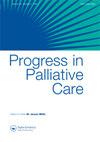Barriers and mechanisms to the development of palliative care in Aceh, Indonesia
IF 0.8
Q4 PUBLIC, ENVIRONMENTAL & OCCUPATIONAL HEALTH
引用次数: 0
Abstract
The aim of this study was to identify barriers and mechanisms in the development of palliative care in the province of Aceh, North West Indonesia. Several factors, including an ageing population, have increased palliative care needs in the region; however, as with many low to middle income countries (LMICs), palliative care is not well established or integrated into mainstream health care services. Consequently, many people may experience serious health-related suffering (SHRS) at the end-of-life. Qualitative semi-structured interviews and focus groups were conducted with key stakeholders in Aceh, Indonesia and a semi-structured interview guide prompted an exploration of palliative care provision, including barriers and enablers. Interviews were digitally recorded, transcribed, and analysed using the principles of thematic analysis. Eight interviews and two focus groups were conducted with medics (n = 6), nurses (n = 7), hospital management (n = 1) and religious/cultural leaders (n = 2). The findings indicate that all participants recognise a need to reduce SHRS and a growing impetus to embed a culturally salient and sustainable model of palliative care within the Aceh healthcare system. The following four themes indicate key areas for further focus: (1) Local vision and leadership, (2) Prioritisation of palliative care policy and funding, (3) Access to palliative care in community and public services, and (4) supporting palliative care in the cultural context of Sharia law, family, and faith. Future expansion requires the identification of a culturally and socioeconomically salient package of palliative care which operates across rural community and acute care settings and is informed by further evaluation and evidence.印度尼西亚亚齐发展姑息治疗的障碍和机制
本研究的目的是确定印度尼西亚西北部亚齐省发展姑息治疗的障碍和机制。包括人口老龄化在内的几个因素增加了该区域的姑息治疗需求;然而,与许多中低收入国家一样,姑息治疗没有得到很好的建立或纳入主流卫生保健服务。因此,许多人在临终时可能会经历严重的健康相关痛苦(SHRS)。在印度尼西亚亚齐与主要利益攸关方进行了定性半结构化访谈和焦点小组,半结构化访谈指南促进了对姑息治疗提供的探索,包括障碍和促进因素。采访被数字化记录、转录,并使用主题分析原则进行分析。对医务人员(n = 6)、护士(n = 7)、医院管理人员(n = 1)和宗教/文化领袖(n = 2)进行了8次访谈和2个焦点小组。研究结果表明,所有参与者都认识到有必要减少SHRS,并越来越多地推动在亚齐医疗保健系统中嵌入文化上突出和可持续的姑息治疗模式。以下四个主题表明了进一步关注的关键领域:(1)地方愿景和领导;(2)姑息治疗政策和资金的优先顺序;(3)社区和公共服务中姑息治疗的可及性;(4)在伊斯兰教法、家庭和信仰的文化背景下支持姑息治疗。未来的扩展需要确定在文化和社会经济上突出的一揽子姑息治疗方案,该方案在农村社区和急性护理环境中运作,并根据进一步的评估和证据提供信息。
本文章由计算机程序翻译,如有差异,请以英文原文为准。
求助全文
约1分钟内获得全文
求助全文
来源期刊

PROGRESS IN PALLIATIVE CARE
PUBLIC, ENVIRONMENTAL & OCCUPATIONAL HEALTH-
CiteScore
2.60
自引率
11.80%
发文量
24
期刊介绍:
Progress in Palliative Care is a peer reviewed, multidisciplinary journal with an international perspective. It provides a central point of reference for all members of the palliative care community: medical consultants, nurses, hospital support teams, home care teams, hospice directors and administrators, pain centre staff, social workers, chaplains, counsellors, information staff, paramedical staff and self-help groups. The emphasis of the journal is on the rapid exchange of information amongst those working in palliative care. Progress in Palliative Care embraces all aspects of the management of the problems of end-stage disease.
 求助内容:
求助内容: 应助结果提醒方式:
应助结果提醒方式:


